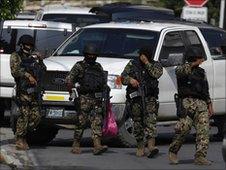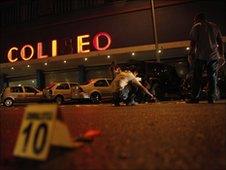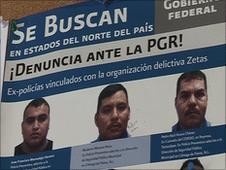Monterrey caught up in Mexico's drug conflict
- Published

Mexico's president has attempted a crack down on organised crime
In Mexico's drug conflict, in which more than 23,000 people have died since late 2006, places like Ciudad Juárez have earned a reputation as some of the most violent in the world.
Now, to the surprise of many in Mexico, it is Monterrey, the richest city in the country and its industrial capital, that seems to be falling into a spiral of violence.
In the first five months of this year, 284 people were killed in Monterrey's metropolitan area - more than the total toll for the whole of 2009.
Kidnapping, as well as robberies, are on the rise in a city usually known as one of Latin America's safest.
This increase in crime is attributed to the widespread presence of the Zetas, one of Mexico's most powerful drug cartels, who are known for kidnapping, extortion and sheer violence against their adversaries.
"Monterrey is Zeta territory. No one can doubt it," said Luis Petersen, columnist and editor of the Milenio newspaper in Monterrey.
Police 'dishonesty'
But how could this city of almost four million people, known for its safe streets and friendly business environment, become such a focal point of Mexico's drug conflict?
Many here point to the fact that the city's wealthy residents are a perfect target for those looking to cash in on kidnappings by demanding expensive ransoms.
They also point out that the city is strategically located only a few hundred kilometres from the US border.
"I think the biggest problem is the infiltration of the cartels in the police forces. You can't trust police to work for the citizens; they work for the Zetas," Mr Petersen said.
Fernando Larrazabal, the mayor of Monterrey's main district, admits that the dishonesty of some police officers is a crucial element fuelling the violence.
"I keep on hearing stories from citizens who tell me that they have been picked up by a police patrol for no apparent reason, and then robbed of their money and beaten up by those police officers," he said.
These type of accusations and the direct links between some officers and the Zetas saw him set out to "cleanse" the police forces - with shocking results.
Only 400 out of the 750 police officers under his command passed a reliability test that included a polygraph session and a close examination of the officers' personal finances.
A massive purge followed and the local government is now recruiting new officers and retraining existing ones.
But the government's fightback is encountering some strong resistance.

Kidnappings and gunfights have become more common in Monterrey
A few weeks ago, two top officials from the Monterrey's municipal government were kidnapped.
They were freed a few days later but many saw in this a message from the cartels that any action taken against them - like the "cleansing" of the police forces - will result in retaliation.
And sometimes that defiant attitude is clearly evident in the city's streets.
Earlier this month, the news that the alleged local leader of the Zetas, Héctor Luna Luna, had been captured, brought this city of almost four million people to a standstill.
In more than 30 different locations around Monterrey, gunmen hijacked cars, parked them in the middle of roads and highways and created huge disruption.
"[That is] the Zetas flexing their muscle," cab driver Roberto said as he was finding ways to avoid the traffic jams.
Crossfire killings
For the people in Monterrey, hearing news about the drug violence has become all too common.
One day in March, the news hit Rosa Mercado and her husband Joel directly.
Their only son, Jorge, and a close friend were killed when on their university campus, caught in the crossfire in a shootout between the military and cartel members.
They said the fact that Jorge was allegedly killed by military fire showed that President Felipe Calderón's head-on confrontation with the cartels has actually fuelled the violence, with more and more innocent civilians, like their son, dying.

Some former officers are wanted men because of links with the Zetas
"Sometimes people say 'Well, they were at the wrong place at the wrong time'. No," said Mrs Mercado.
"Those who were at the wrong place at the wrong time were those in the shootout. My son and his friend were in their space."
A fellow student, Gilberto Miranda, said those killings showed that believing that the city would avoid becoming entangled in Mexico's drug conflict was naive.
"Monterrey was a vanity fair and that vanity mirror broke with this punch of reality," he said of the deaths in the campus of the Tecnologico de Monterrey, Mexico's most prominent private university.
He said that people in Monterrey have changed their attitudes, are increasingly concerned for their safety, and eerily aware of how much this city has changed.
"The only risk that we are equal to now is the risk that you, me or anyone who's walking in the street might catch a bullet."
Hear more in a full report by Julian Miglierini, on the BBC's World Tonight.
- Published9 June 2010